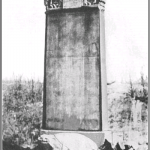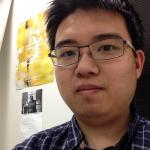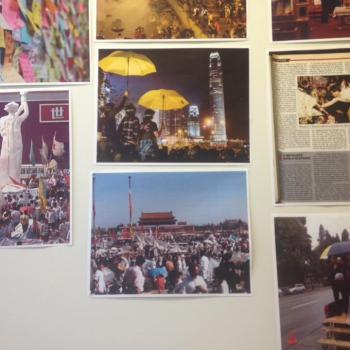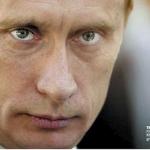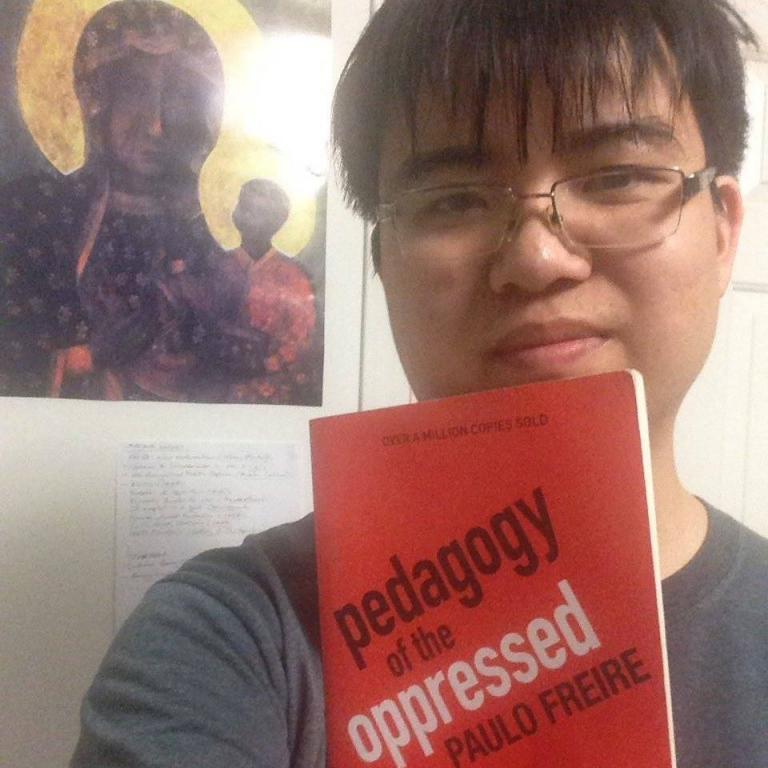
This is the fourth in a series reflecting on what I’ve been doing on the blog. The first, second, and third are here.
Shortly after I returned to start another academic year at Northwestern in the fall of 2017, I had a conversation with Sam Rocha that once again changed my life. Of course, if there is anything that my friendship with Sam has taught me, it is that he never really sets out to change anyone’s life. He is just a person, he expects the same of his friends, and he is frustrated when we do not live up to his expectations. But even while he is taking us to task for our idiocy, he does say beautiful things in spite of himself, and despite his intentions to express his frustration at me, he said some mysterious words at that time that took about a year to truly blossom.
Sam told me that I had daddy issues. It was inhibiting my academic work, killing my confidence, and murdering my career. We had been discussing my intellectual future, and I had rattled off a list of influences to whom I was indebted, and Sam was not having any of it. He wanted to know what Justin Tse thought of things. That honestly scared the living daylights out of me, which is a disaster for any academic, though as a trusted colleague soon confirmed, Justin, sometimes you have no argument. At that point, I was still stuck in the persuasion that what it meant to be collegial was to be able to say everything else that other people said before I had my turn in talking, and that, Sam diagnosed, was precisely what was killing me. Go read some Emerson, he told me. I balked when he said that the relevant essay was ‘Self-Reliance‘ – was it not, I mused, some feminist scholar whom I had heard say that Emerson was a hypocrite when it came to self-reliance because he had relied on his family and servants to provide for him? Still, Sam is Sam, and I was still the obedient sort at the time, so I obediently read Emerson’s ‘Self-Reliance’ and proceeded to have my mind blown.
Emerson’s ‘Self-Reliance’ is not a manifesto on relying on oneself in the practical needs of everyday life. It is much more about how a person should think. The problem, Emerson seemed to be saying, is that if a person thinks only the thoughts of other people, none of that thinking will be with any inner conviction. The problem is that none of it will be convincing, then. In order to be a convincing thinker, one had to throw off the yoke of other people’s thinking, even though one might recognize that one is in conversation with them. The question is what do I think about a certain situation, or a text, or a person. It seemed uniquely compatible with the Jesuit discernment of spirits that I had learned from my spiritual father (there you go again, I could hear Sam saying), and surprisingly, I quite liked Emerson’s style, even though he was what my discipline would consider a dead white man.
The problem with not having exercised my argumentative muscles out of the habits of a long cowardice is that I began making a number of mistakes when I flexed them, mostly by becoming obsessed with everything that Sam was. This is a terrible habit that I have made many attempts to quit and probably have more recently done so than I care to admit. My wager is that it has put my friendship with Sam on the line more times than I can imagine. I began obsessively reading Bonaventure, for example, trying to piece together his style of the discernment of spirits with the Jesuit one, just because I knew it was Sam’s cosmology. I thought through why I do what I do on the Internet, much of which I learned from Sam (I had even been brought onto Patheos by him), which made for some interesting musings on trolling comments and even the Gamergate controversy, which gave birth to the legions of alt-right trolls against so-called ‘social justice warriors.’ I tried to work out why it was that he didn’t like my article in Progress in Human Geography titled ‘Grounded theologies’ and why he was suspicious of my Eastern Catholicism even though it was obvious I had found a home there. Sam has always apologized for me over the years for the demands of friendship he places on me, as the love we have for each other as brothers is total. The truth, however, is that my end of the bargain is just as demanding, and if only he understood as deeply as I do that I know at a gut level how hard he’s had to work to be my friend, he’d be in tears.
Eventually, I got off the blog and began working on a piece – several pieces, in fact, but one essay to rule them all, as it were. It was a monster piece, a revision in fact for a peer-reviewed article that I am now revising in its final stages and is due to be submitted any moment now. It is also a homage to Sam. I don’t care to comment too much on it so as not to steal my own exegetical thunder, but it is a piece where I theorize what I take to be the real meaning of the term often touted in Asian American studies, model minority, in relation to the term in the philosophy of education, miseducation. Of course, Ms Lauryn Hill makes it in, but there are also appearances by some old favourites from this blog: Ivan Illich, Paulo Freire, Carter Woodson, and Gary Okihiro. The basic thrust of the argument should be familiar to readers of this blog – it is that education is not the same as schooling, that school is an institution that usually gets in the way of learning, that it is a mistake to think that this problem can be solved by studying minority communities, and that the real way out is to situate oneself from within a colonized community and then analyze the structures of the world in relation to one’s consciousness. I basically argue for my own praxis, more or less, although it is probably more fair to say that I came to that articulate of what I do through writing that piece. I’m going to pull through with my end of the bargain to make sure it comes out sooner than later.
The problem is that with such an argument in mind, I began to fantasize and lose sleep. If it really was the case that schooling was an institution that got in the way of real education, then what did that say about academia? Did I belong in the academy? Was I wasting my time? Shouldn’t I be out there helping people? At this point, I had more than one beer session with the Asian American evangelical-blogger-turned-Catholic whose chrismation I had attended. Her story is her own to tell some day, but suffice it to say that we commiserated quite a bit about not being able to figure out the meaning of community, which led to the languishing of our interior lives because we had no idea what we were doing in our lives anymore.
Desperation is the factory for bad ideas. I had a lot of bad ideas, mostly framed around how to help people. It would be embarrassing for me to enumerate what those ideas were, so I will not, except to say that most of them involved ludicrous schemes and terrible business models. I managed to convince a number of my friends and family of some of my more interesting proposals, though, and they became enthusiastic because I was at last talking like one of them now, invested in the community and not in my own career, off my high horse and down on earth, as humble as any other person in this world who is cognizant of their own incompetence. For all that is said about Chinese people being ‘model minority,’ there are very few academics in my Cantonese community. Some pretend to be, but their credentials aren’t always kosher. The more my ideas resembled theirs, the happier they seemed to get, and I lapped it all up like a dog returning to vomit.
I too began to get excited, and as I got more worked up, I sent my Cantonese people the essay I wrote on Sam. They then had terrible news for me. They told me that they liked the piece, that it was understandable and readable and passionately written. The problem is that it was an academic piece too, and that should be a signal of where I actually belong: the academy. Perhaps the best refrain came from a real estate agent from my home temple whose chrismation I later had the privilege to cantor, speaking in the bluntest of Cantonese accents – your ideas are very academic, not what normal people would think, so either you become very normal or you stay academic, and I think you know what you should do.
I had been prepared to throw it all away for the sake of my community – family, friends, church, and the Cantonese world, if I were to be honest – and the message I got back from them was basically that I should stay put. The academy, with all of its politics, and problems, and publication protocols, and precariousness, is where I actually belonged. In the past, I could feel the admiration of people from my communities at a distance, and sometimes their demands on my time as someone they thought should belong to them. For quite a while, I resented it, even telling some of them that their demand for my presence among them was going to kill my career. But now – as if as a macrocosm of my demanding microcosmic friendship with Sam – I suddenly felt their support, like a badly needed wind pushing my stalled ship out onto the seas. It wasn’t, however, that they were pushing me out. If anything, it was more that I could feel their appreciation in knowing that no matter where I was, I would never turn my back on my family. I knew who I was and where I came from – them – and they had my back as much as I had theirs, and what’s more, I’d never have to let their bad ideas get to my head again.
And so I began to write with renewed energy. I wrote peer-reviewed pieces. I wrote book chapters. I blogged. I had to recount the story of how it came to be that one moment I felt like I was situated above the community that had given me life and about which I had written, and the next, I was among them, even wanting to stay with them, and finally felt like I was one of them, even though I was not Cantonese Protestant anymore, but in the Kyivan Church. I called that story ‘my conversion to liberation theology.’ Someone wrote me immediately to point out that the magisterium of the Latin Church had condemned the Marxism of the liberation theology. I did not recognize myself in the accusation because I was actually just intending to write the story of how I became part of my own community through my intellectual work, although I did register that I should read Marx more closely as a result. I eventually joined a reading group on Capital the next quarter at Northwestern and then taught a directed studies on it to two students in the spring. It is therefore not unfair in the final analysis to say that I developed some Marxist convictions through this part of my writing journey, then.
The posts began with my being enthralled during my doctoral studies with the school of theological thought known as Radical Orthodoxy. With the theologian John Milbank as its ringleader of sorts, Radical Orthodoxy proposed an account of what community was that contrasted secular forms with ecclesial ones, in a kind of riff on Augustine’s City of God. Claiming to follow the theorist René Girard, what Milbank and others proposed was that a secular way of being enshrined violence as a social way of doing things. However, Christians who thought theologically about their communities would realize that they were advancing an ontology of ‘harmonious communion’ in the world, with the differences in their social orders as a kind of harmonic structure. It was a fascinating account of sociality – a social way of being – and it had been legitimized by a number of scholars I also read, such Stanley Hauerwas, Charles Taylor, and Bill Cavanaugh. For the record, I still love Cavanaugh. He’s the most Catholic of them all.
What Radical Orthodoxy required of me, practically speaking, was to separate my politics from my academic work. This was eventually what led to the disaster. Radical Orthodoxy’s claims as a school of thought rested on a critique of the secular as a kind of theology unto itself. This genealogical work is the part of Radical Orthodoxy that I still agree with; it’s difficult to refute that what we call secular is a perversion of Christian theology in the Latin tradition through developments in the Latin Church, mostly because Milbank had also not been the first to say it (Péguy, de Lubac, Illich, and de Certeau are good examples of precedents). However, practically speaking, this claim had led to a deep-seated desire to protest the structures of the Protestant communities of which I was a part and that I was researching. I repressed those desires because I was not supposed to be getting involved in my own empirical work. One could say that this was admirable in a misguided way, to have some distance from my academic study. But for one thing, it didn’t work because I was always saying things about Cantonese Protestant communities anyway, as well as Asian American evangelicalism, as well as evangelicalism writ large, and had developed an irrational fantasy about how Catholicism would swoop in to save the day too, much as I denied it at the time.
What the Umbrella Movement in Hong Kong truly did for me – for me alone, not for Hong Kong – was to expose me. I cared a lot, not just about the politics of the church, but about how the church might involve itself in democratic activism in society. The problem, however, with telling the truth suddenly is that I lost my theological language for talking about Christian communities. I described writing at the time as if there was a train of words that was coming at me whenever I would type, and while that was not just metaphorical, it also illustrates the confusion I was in. I wanted Christian communities to be a certain way. They were not that way, and that frustrated me. I wanted to write about them, but I came off sounding polemical. In fact, I had an article or two rejected precisely because of their polemics.
I had encountered Eastern Catholicism through the Umbrella Movement, though, and it led to the most unlikely place for getting out of my conundrum: liberation theology. It turns out that if one actually reads liberation theology, one finds that folks like Gutiérrez, Segundo, the Boff brothers, and Sobrino are all theorizing community too. But instead of working from predetermined conclusions about what communities are good and which aren’t – or which are more secular than others – they preferred to go the route of what Paulo Freire called conscientization in Pedagogy of the Oppressed. The idea was that it was through critical dialogues with the people that they might discover the structures of society that were colonizing their consciousness, and through those radical practices, they might themselves propose avenues for revolutionizing it. In liberation theology, the people in the community get to do things, to be agents in history, as it were. It struck me that this was the kind of thing that I had actually been doing all along in my research on Cantonese Protestants – asking them for their conceptions of civil society, concrete political networks, and public practices – but it made my intellectual mistake plain: I was working way too hard to fit my writing to an ideal, when the truth was I should just write to describe what I saw. This, I learned as I not only became Eastern Catholic, but was also to teach Asian American studies at Northwestern, was basically what Asian American studies was about, no more, no less. It also became the mandate of a group of people in the Kyivan Church in Chicago we pulled together that we jokingly call the Kyivan Psychoanalysis Study Group.
As I worked through this narrative on my blog, Sam got in touch several times. He said that he was finally coming to understand me and that my writing had become very clear. Now I was really narrating myself, talking through my process, working through things I had actually done instead of confusing them for things I wanted to do. Almost as if as affirmation, a major university at the time also wrote me to say that they had read a job application I had written and liked it enough to put me on a shortlist. I didn’t get the job in the end, but Sam also read the materials and said that it was some of the most deeply personal yet fiercely competent stuff he had read from me since. I replied to tell him what I thought of all those daddy issues he had accused me of having. I said that this whole process of discovering the meaning of community through liberation theology had taught me to value my brothers more than my fathers. Though this conversation took place over instant messaging, I could feel that he was touched.
I asked him after a while if I was really doing liberation theology, or if I was doing something else. Unlike me, Sam actually teaches liberation theology for a living at my alma mater, the University of British Columbia, and he knows what he is talking about on the subject. He replied that it was not, in the end – that it was a valuable intellectual stepping stone for me, but that I needed it and that I’d be on the right track from here on out. He also encouraged me to keep writing, so I did.
In fact, as I arrived at liberation theology, I felt compelled to say some things about why I had been averse to it in the first place. To do that, I had to go all the way back in time to my days as a kid in the Chinese church and my experience of being inculcated with the values of what can only be called model minority: do well in school, as that is the pathway to success for all your dreams. I reflected that while this may have been the dominant culture in the communities I grew up in, there was another strand consisting of therapists who thought it was their job to fix the community from their inhumane, success-driven model. However, this kind of educational stratification only built into me the bad intellectual habits of suspending me above the communities that I wanted to study and that I frankly loved, even though I had become Eastern Catholic and was paralyzed over writing about them. Two more posts then rounded out the study, one on the convergence of the anti-institutional work of Ivan Illich and Leo Tolstoy’s short story ‘The Death of Ivan Ilyich,’ and the other celebrating the places from which I had come.
But lingering in that suspended intellectual gap between being in and from the communities I was writing about, but not of them, I then began to meditate on the fantasies that I had lingered on since I was a kid, including the ‘Hong Kong man’ dreams of being James Bond. I even told the story of how the church of my adolescence in Fremont, California basically imploded because every other guy there wanted to be 007. I was quite proud of that post, but it has also been among the least read on my blog, probably because it was both long and not relevant enough to some readers looking for Catholic apologetics. I then took a step back to reflect on where I had arrived through liberation theology, and it was nothing short of an opportunity to critically interrogate the fantasies that dominated my own consciousness. It was a chance, if you will, to use the blog to begin a critical dialogue that might lead to my own further conscientization. Sam was right. What I was doing was not exactly liberation theology. But what it had resulted in was the beginning of a kind of psychic freedom for me in which I could recognize him as a brother, tell my own story with honesty, and write about Cantonese Protestants and even Asian American evangelicals with some intellectual integrity.
When I realized that that was happening, I turned – or, should I say, returned – to a practice of psychoanalysis that I had long forgotten as once having been taught to me as part of Catholic praxis. It is to that that I will turn in my next reflection, as I began to write in earnest about the formation of my own fantasies on the blog and to experiment with how to communicate them to a public audience – to really start narrating myself for real.

